Before the beginning of the full-scale stage of the Russian-Ukrainian war on February 24, @bykvu Instagram page had about 25.8 thousand followers, the average number of likes under the posts ranged from 200 to 500, and 1000 likes were the reason to congratulate the SMM department on a successful publication .
As of early December 2022, Bukvy has over 201 thousand followers on Instagram, and 1000 likes under a post is an indication of a bad post, as the average is around 5000. Over the past few months, our posts have been reaching between 3-5 million monthly. Despite this, we consider the formation of a community and stable relations with our audience and the opportunity to be near and help in difficult times of war to be a much more important result.
The key principle of developing relations between Bukvy and the audience is a two-way exchange of information, emotions and experiences on a parity basis. We do not teach or dictate opinions. Instead, we communicate with our readers and shape our content taking into account the comments of the audience, if they are valid and correct. This applies both to the topics of publications in general and to each specific post. We respond to all critical e-mails and comments.
Of course, this does not mean automatic acceptance of any critical remarks from the audience. For example, on the 28th anniversary of Ukraine’s signing of the Budapest Memorandum, according to which our country renounced nuclear weapons, relying on international security guarantees, we published an interview with Harvard professor Serhii Plokhii about why the abandonment of nuclear weapons was the only possible course of action for the democratic state that Ukraine aspired to become.
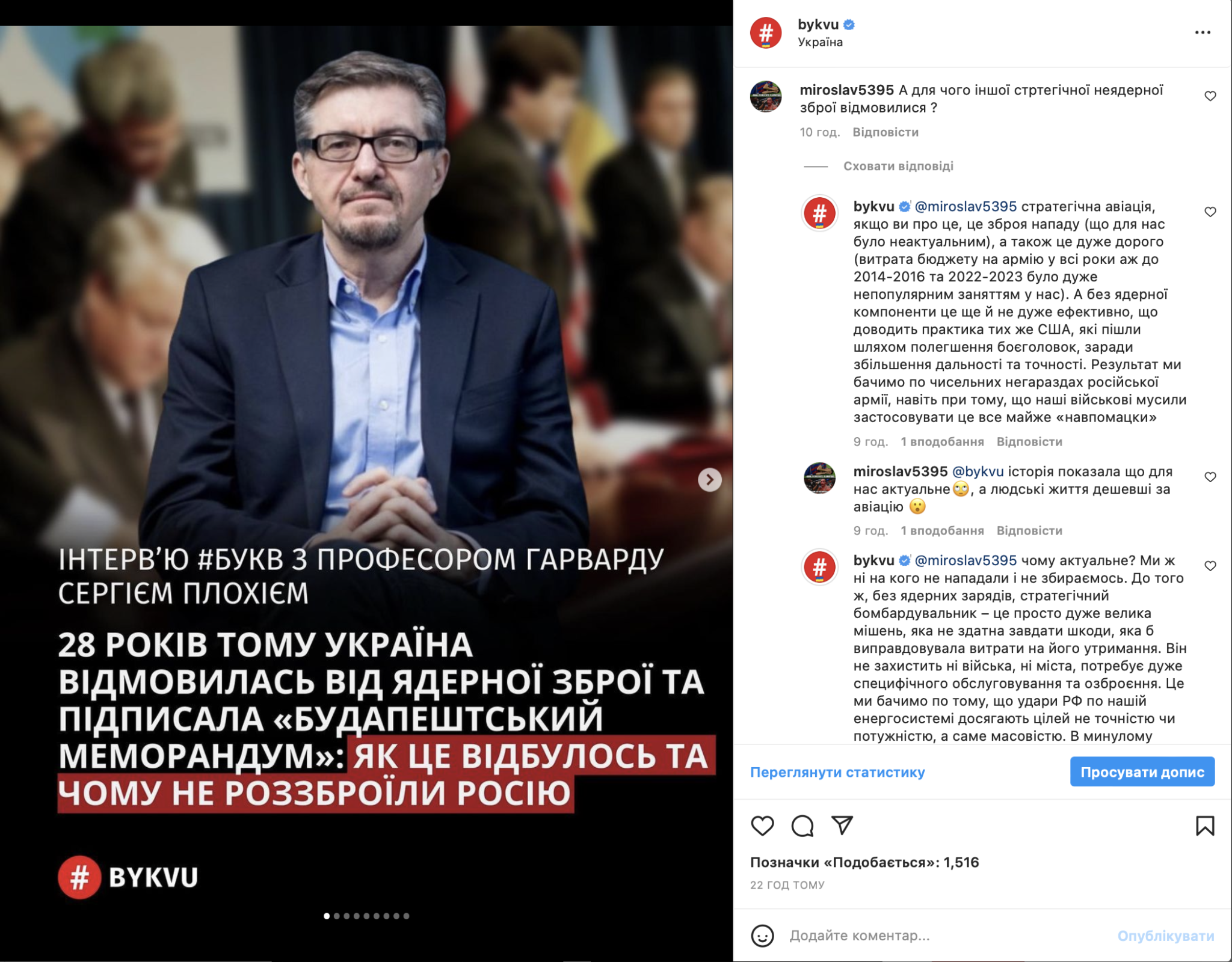
The post about the prerequisites and reasons for Ukraine’s renunciation of nuclear weapons and Russia’s preservation of its nuclear arsenal. The reader’s comment about the reasons for abandoning strategic non-nuclear weapons and our explanation that bearing high costs for weapons designed for attack, not defense, was not and is not part of Ukraine’s priorities, since such weapons will not protect us from the threats with which Ukraine faced during the Russian invasion.
Today, when Russia has occupied about 20% of the territory of Ukraine, killed hundreds of thousands of Ukrainians and forced millions of us to become refugees, the issue of giving up nuclear weapons in exchange for guarantees that were not respected is extremely painful for Ukrainians. It is natural that many people consider the preservation of the nuclear arsenal and means of destruction of the enemy’s territory a guarantee that something like this could not have happened. Instead, we try to explain that the mere presence of nuclear weapons is not a guarantee of security, and their use would remove the possibility of integration into the international community. In addition, the costs of such weapons are disproportionate to the theoretical result of owning them.
We tell Ukrainians about their compatriots who, in difficult times, left their usual lives and devoted their time, health, and often their lives to their Homeland and nation. We tell about volunteers from other countries who left a peaceful life and stood side by side with Ukrainians to protect our freedom.
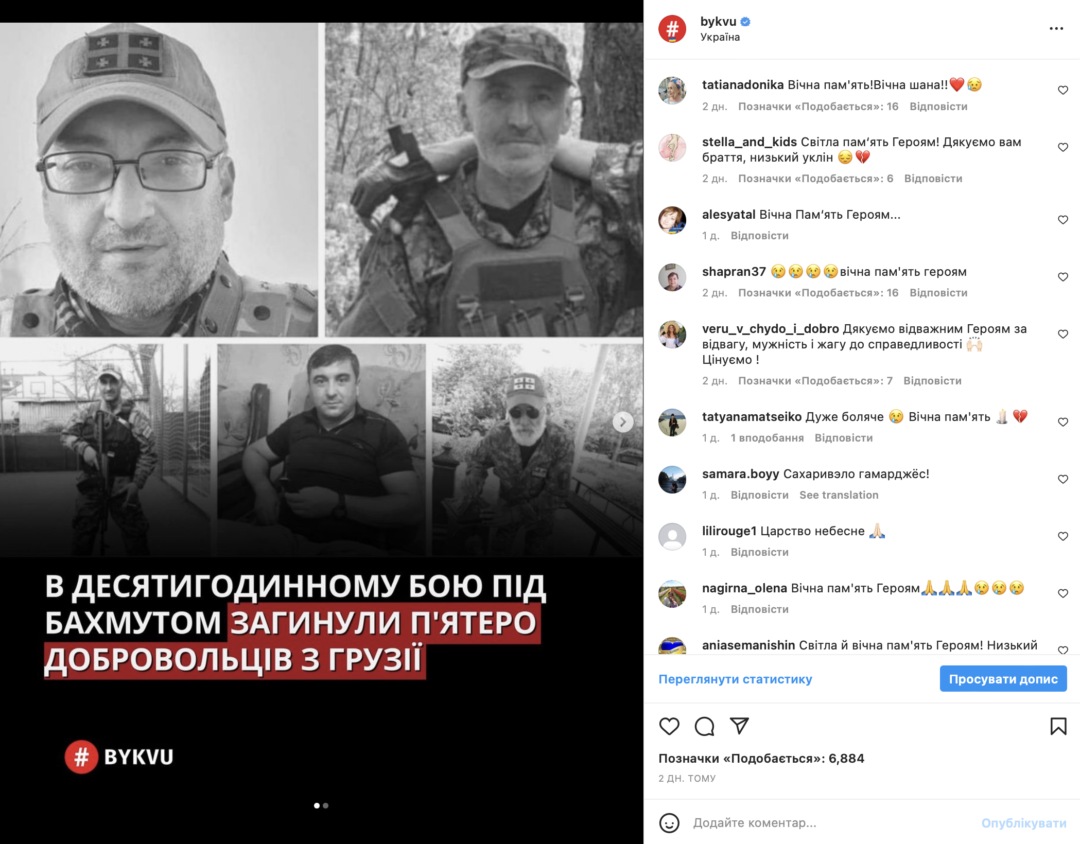
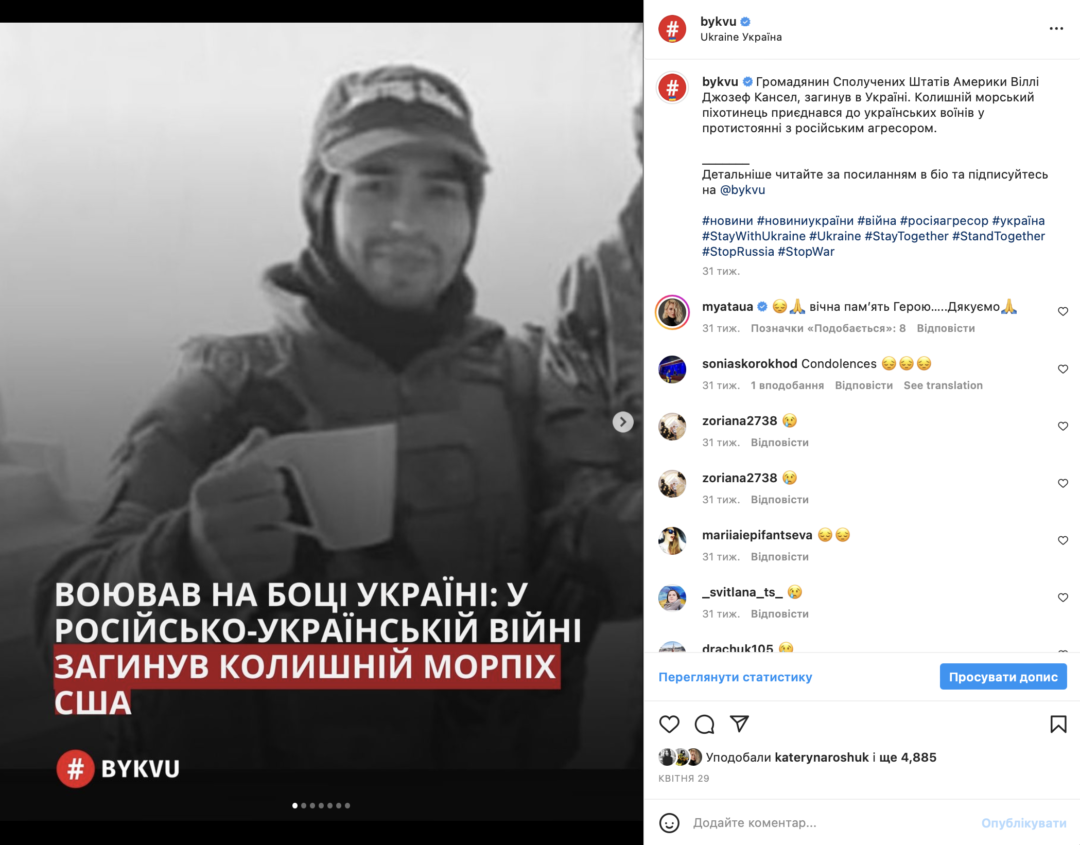
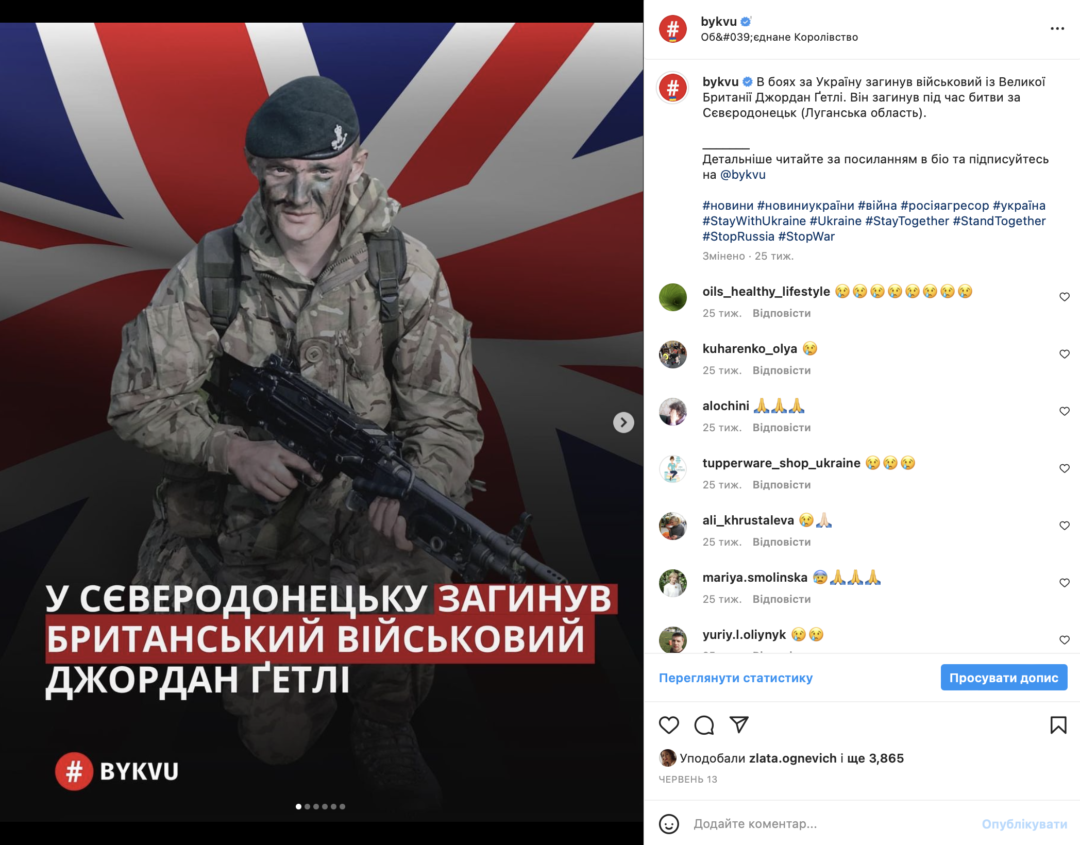

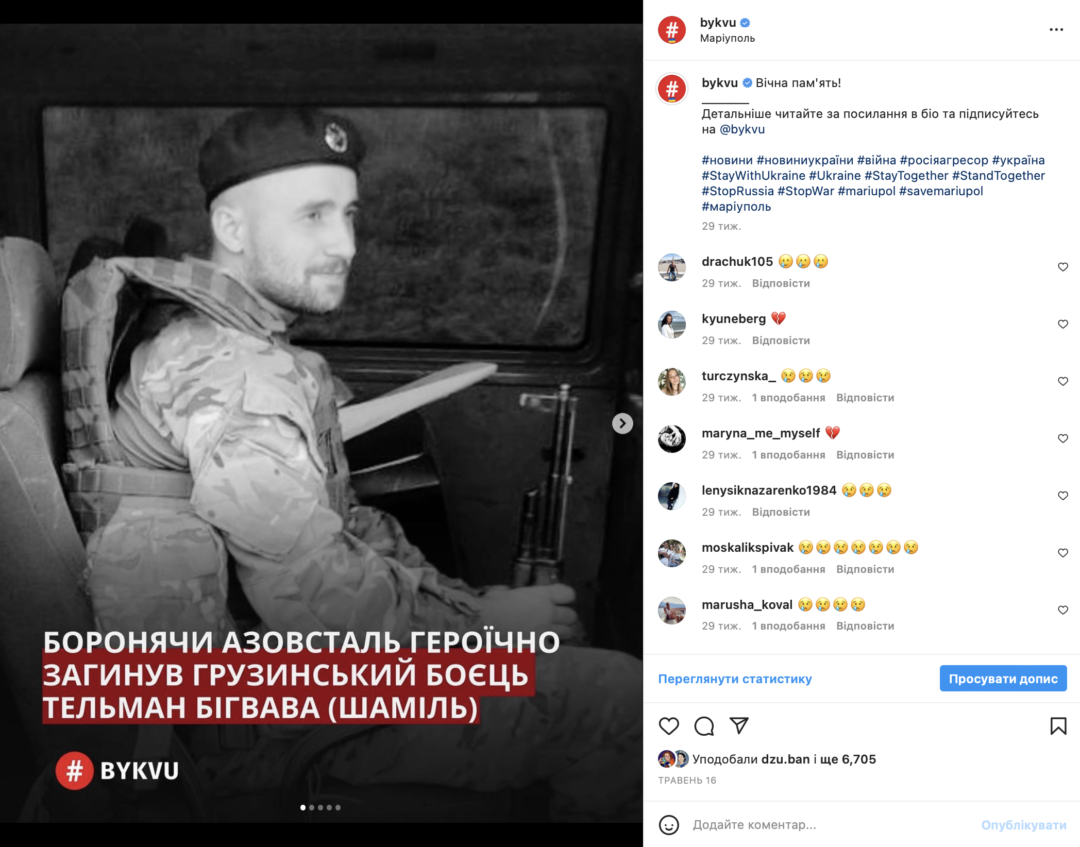
The posts about foreign volunteers who died in battle against the Russian army.
We honor the memory of the fallen heroes who died protecting Ukrainians from Russian aggression. We tell about those who continue to resist the aggressor and heroes who do not think they are doing something heroic. They they are doing what they have to do. Over time, our readers – relatives and friends of the Ukrainian military – began to write to us more and more often. After verifying their information and obtaining permission for publishing, we tell their stories.
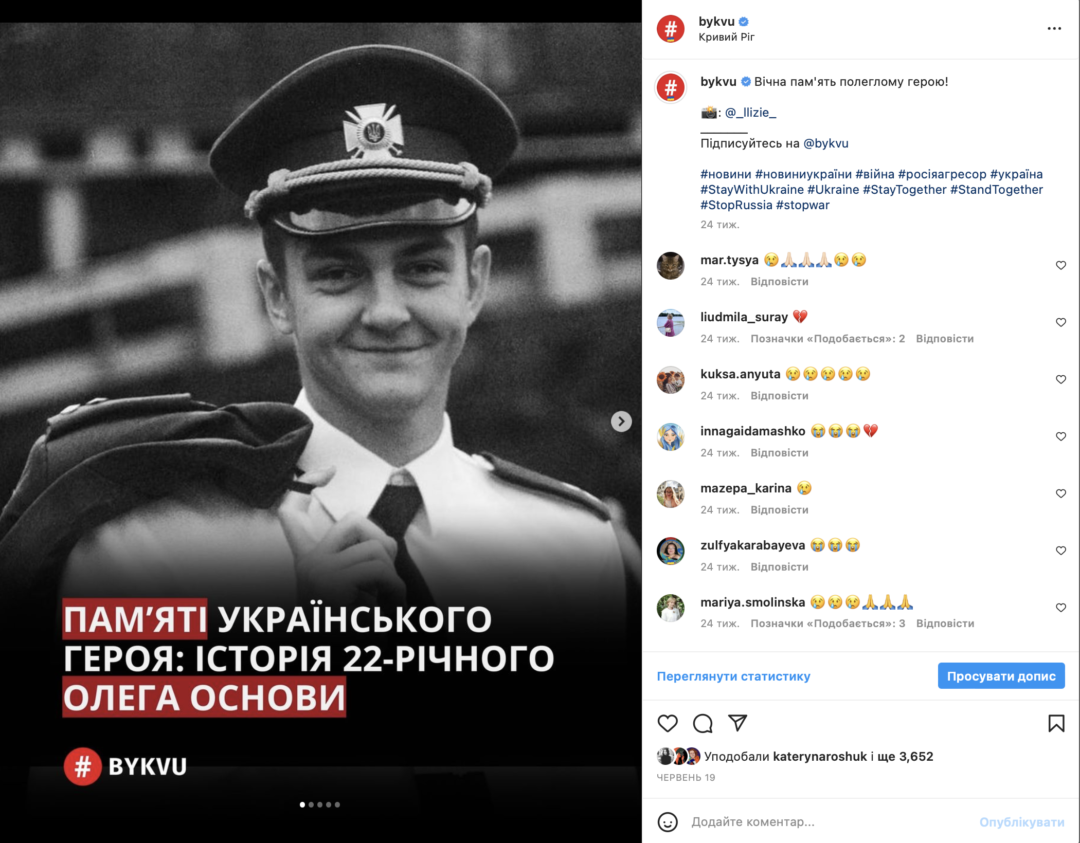
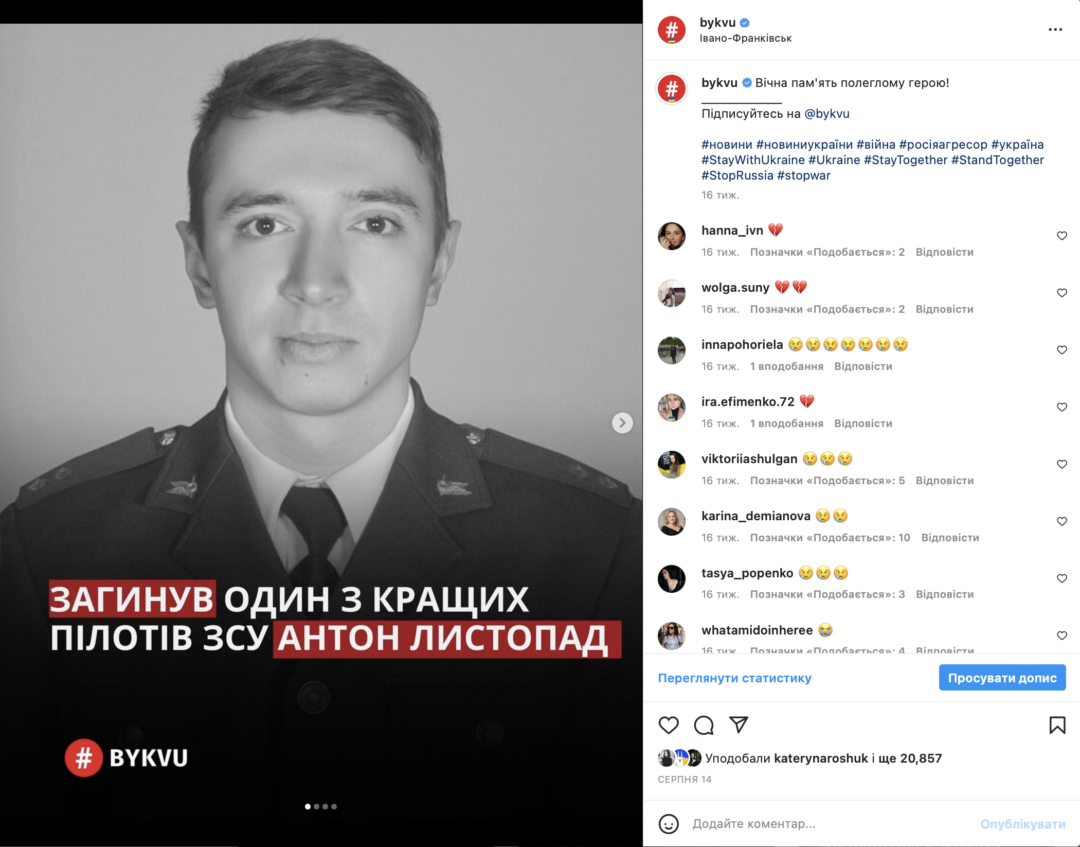
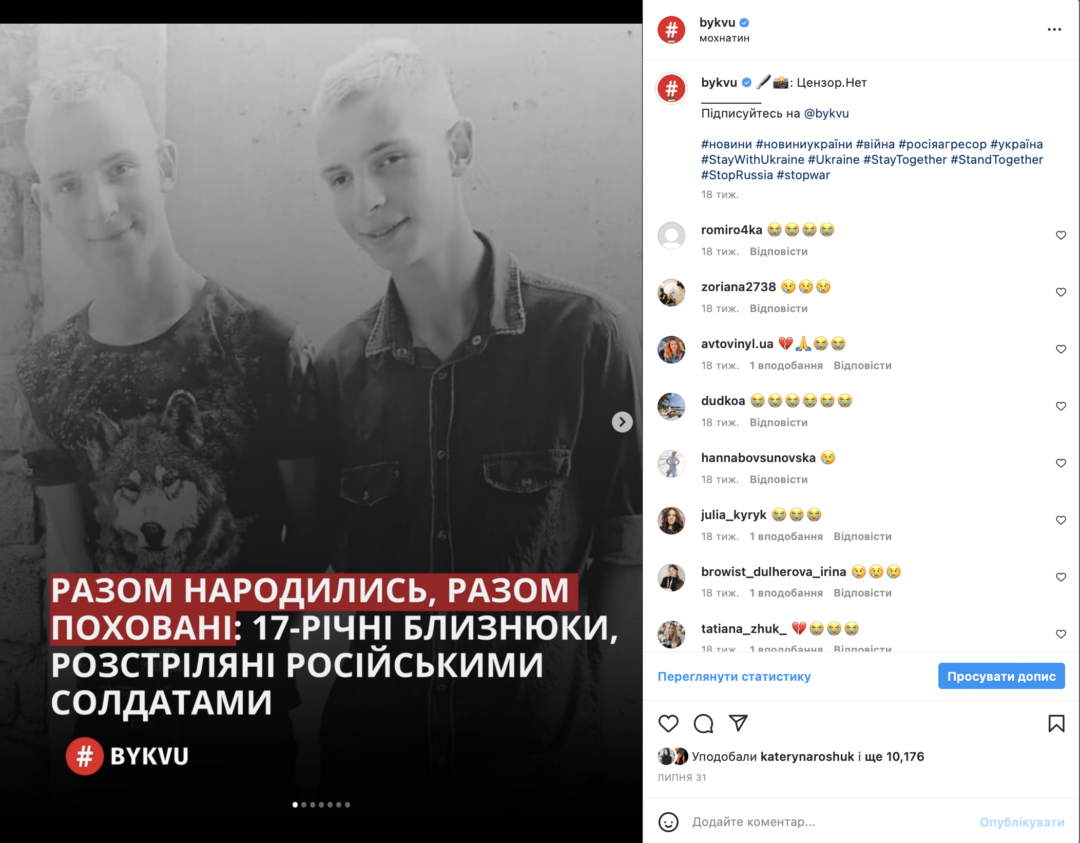
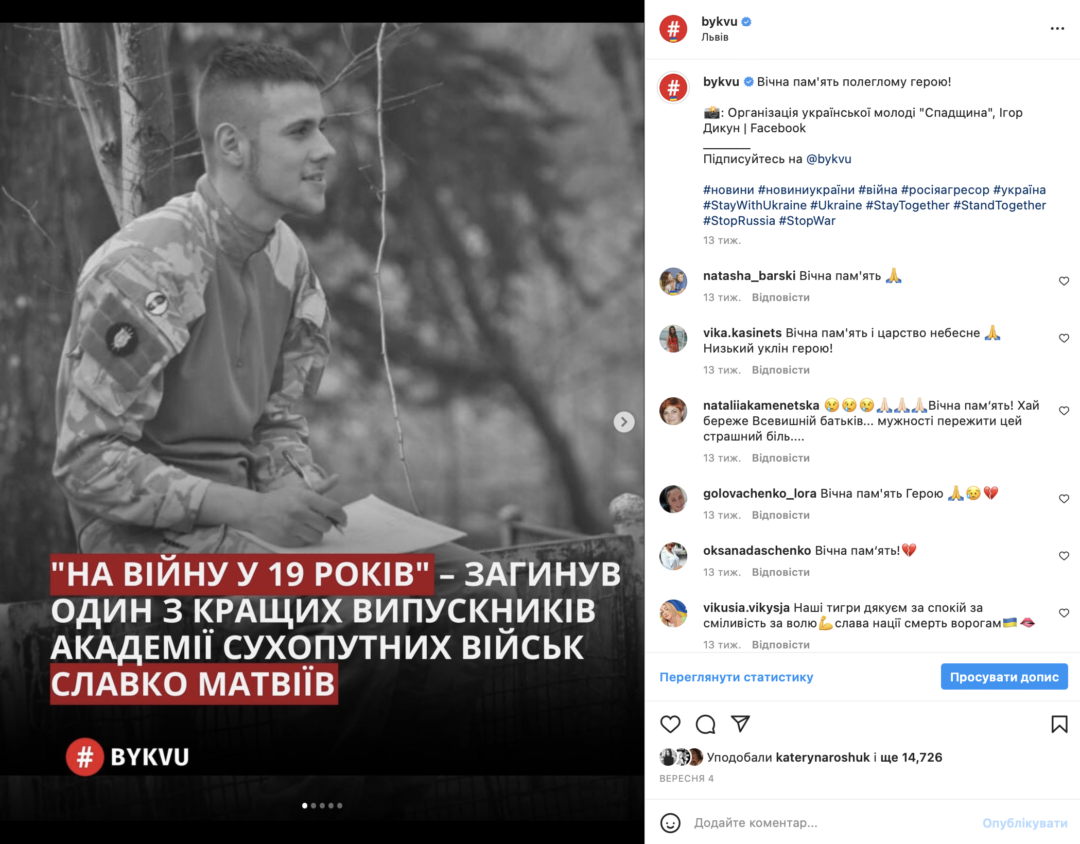
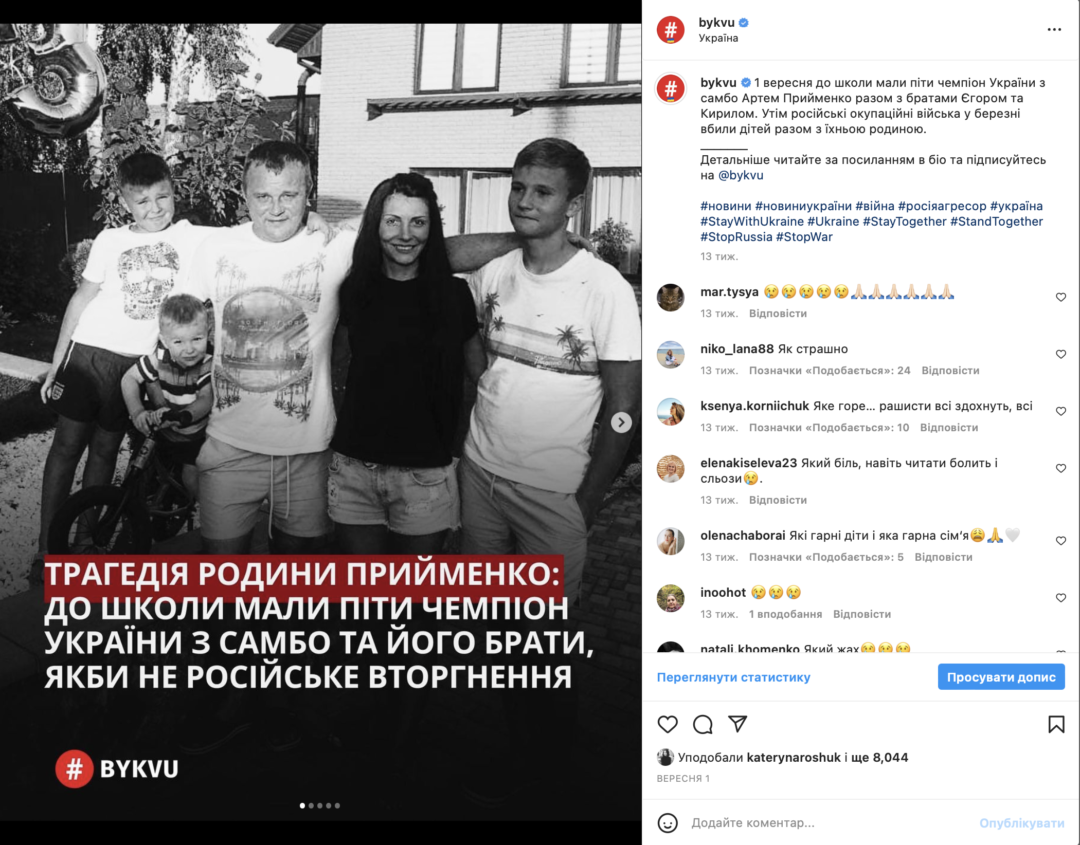
According to the official data, about million Ukrainians currently serve in the military structures: the Armed Forces and Territorial Defense (part of the Armed Forces of Ukraine), the National Guard, Special Operations Forces, etc. It is likely that dozens of thousands civilians will have to wear military uniforms and take up arms until the territory of Ukraine is liberated. Most of them did not choose military service as a career. They joined the army voluntarily or were drafted to protect Ukraine from the Russian invasion.
Today, these people are largely cut off both from their usual surroundings and from their families. This is a hard test, which, in addition to the constant stress of living in the field and the threat to life and health, significantly affects the state of mental health. Ukraine has already faced problems of adaptation in civilian life of people who returned from the war (the Russian-Ukrainian war began in 2014 with Russia’s occupation of Crimea and parts of eastern Ukraine, and dozens of thousands Ukrainians participated in military operations before the beginning of the full-fledged invasion). Therefore, it is extremely important for us to facilitate maximum understanding between the military, who return to civilian life, and civilian population.
The example of such efforts is a post about how life in war affects person’s mental condition and how adaptation to constant danger occurs. Written from the personal experience of an intelligence officer in the Airborne Forces, this material resonated with our readers. We received many comments about the usefulness of this post. One of the comments was from the mother of two servicemen. Under the same post, a person who had to escape from Mariupol, which was destroyed by Russia, told us his story. This willingness to share personal stories is extremely valuable to us.
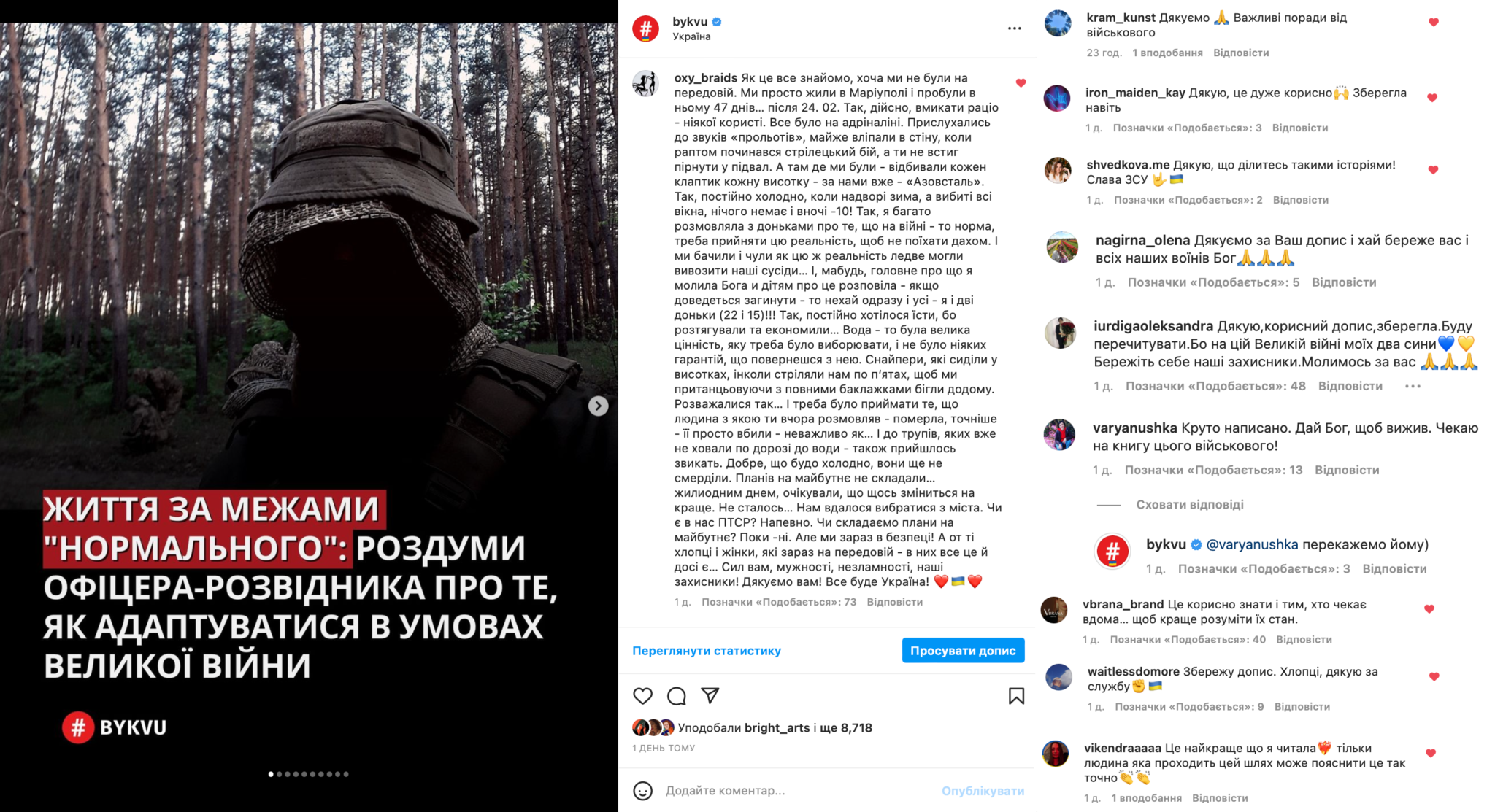
The post about how being on the frontline influences person’s mental condition and about methods of adaptation. Our readers commented that they decided to save this post for the future and admitted its usefulness for better understanding of the military who will return from the war.
In the war conditions, the unity of the society and reconciliation of internal contradictions that existed before is of particular importance. For Ukraine, one of these topics is the issue of the LGBT+ community, the legal and social integration of its representatives into the society on equal rights. We have devoted a number of posts to this topic, of which we would like to highlight two. The first is the story of a woman who decided to become the wife of a gay soldier, despite the fact that he has a partner and is not going to end the relationship with him.
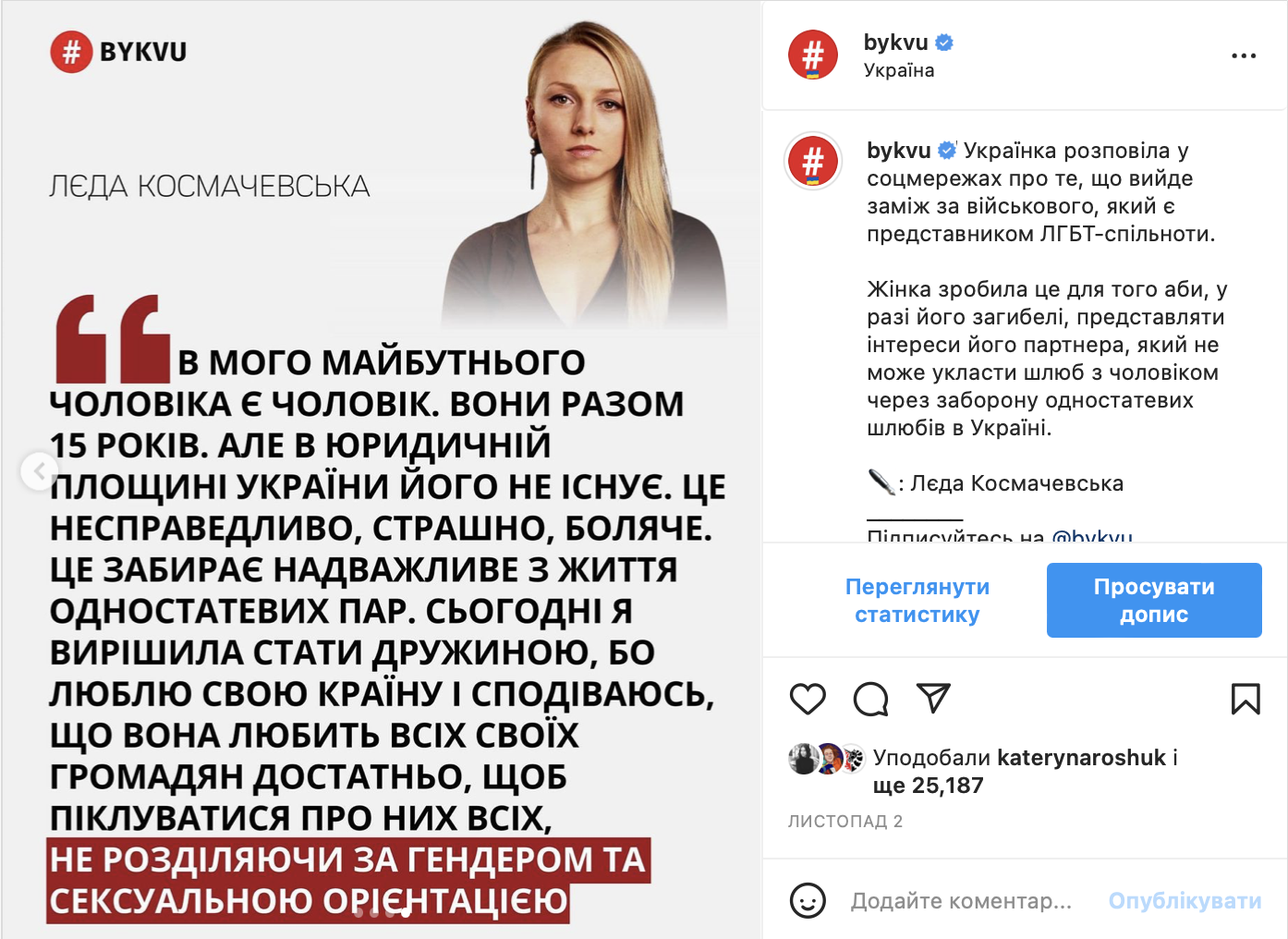
The reason for such an act is that the partner of this military man is legally a stranger to him (same-sex marriage is not legalized in Ukraine), despite years of living together. Because of this, in the event of injury or death, the partner of a military man will not be able to make legally significant decisions, to receive the compensation provided for by law, and will not even be allowed to visit him in the intensive care unit. Therefore, the woman decided to take the role of a “legal wife” to represent the interests of her formal husband, despite the fact that both he and she are in other relationships with other people. We received more than 25,000 reactions and hundreds of comments on this post, the content of which was mostly reduced to the fact that such a situation is absurd, since there is no good reason why same-sex couples should not be able to formalize their relationships and acquire the status of a family.
The second post on this topic, which we would like to mention, is the story of a military medic who decided to openly talk about his orientation and experience of participating in combat operations. Our audience generally welcomed this post, emphasizing the importance of actions rather than person’s sexual preferences.
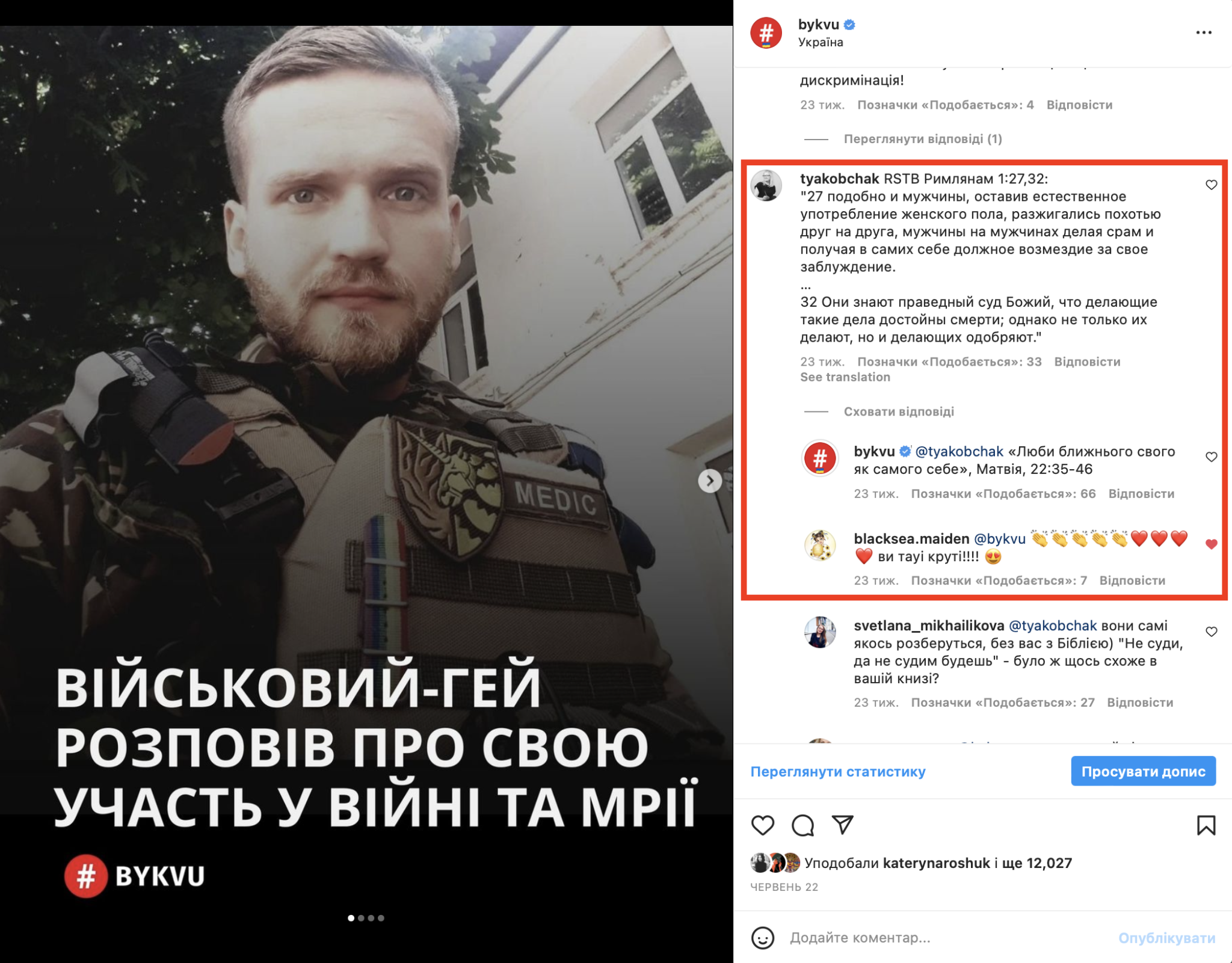
However, one of the readers decided to express her disapproval by citing a passage from the Epistle to the Romans in which same-sex relationships were condemned. When answering her, we also used a passage from the New Testament, namely the Gospel of Matthew, which talks about the Christian’s duty to love your neighbors as yourself. The screenshot shows the number of positive reactions to both comments and the admiration comment of another reader.
Of course, this requires from the editors not only understanding of the context of each individual situation, but also knowledge in areas such as religion or anthropology. Thus, changing the communication strategy requires the team to be ready to react to the topics from religion to military affairs and fashion.
Paying a lot of attention to hot topics, we still try to devote the lion’s share of the content to the stories of Ukrainians, each of whom is fighting their own battle these days. We consider it necessary to tell Ukrainians about their fellow citizens from other parts of Ukraine who took the brunt of Russian aggression. We tell about doctors from Kherson who hid children to save them from forced deportation to Russia. We tell about people who maintain resilience and a sense of humor, hiding in shelters from Russian missiles launched on peaceful cities. A sense of humor is also a weapon of Ukrainians. We tell about museum workers who risked their lives to save unique artifacts from looting. We tell about people who did not leave their workplaces for days and weeks because the lives of others depended on them. We tell about volunteers who risk their lives to bring food and medicine to the frontline areas, evacuate those who cannot leave on their own, and even take out animals because what could be a better demonstration of humanity than risking one’s own life for the sake of the lives of others. We told about the children’s writer killed by Russian soldiers…
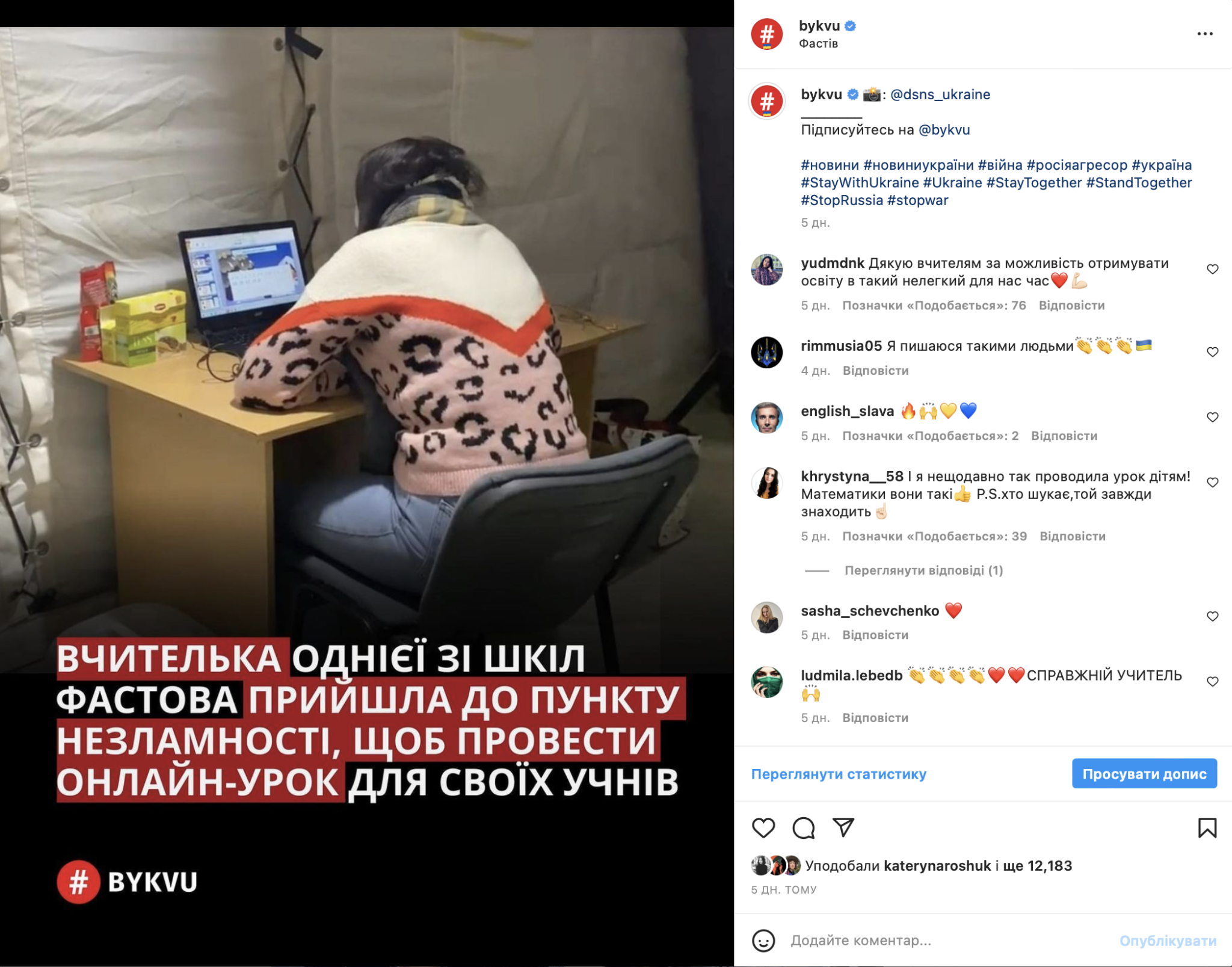
The post about a teacher conducting a lesson to students at the “Point of Invincibility”, one of the heating centers that local governments and private businesses set up around the country so that people can charge their gadgets, get Internet connection, stay warm and get a hot drink.
During the blackout caused by Russian strikes targeting the energy system of Ukraine, we pay a lot of attention to telling our readers how Ukrainians behave in the conditions that are unimaginable in the EU since the Second World War. The screenshot above shows a teacher conducting an online class in the Point of Invincibility. In the comments to the video, we explained how these points function and what the role of private business is in providing assistance to Ukrainians in this difficult time.
Our goal was to help the audience understand that despite the difficult economic situation and the significant costs incurred by businesses for the purchase of generators and fuel, entrepreneurs and companies are engaged in a joint struggle to preserve our freedom, giving the opportunity to work, charge gadgets and warm up for free.
In addition, we try to support the morale of our readers with jokes. For example, under the post about the ban on premarital sex in Indonesia, there was a comment from a fake account promoting pornographic content (we are actually amazed at how many such Instagram accounts exist, even though it is against the rules of Meta). Of course, we did not expect a response from this account and blocked it, but we were able to cheer up the real readers.
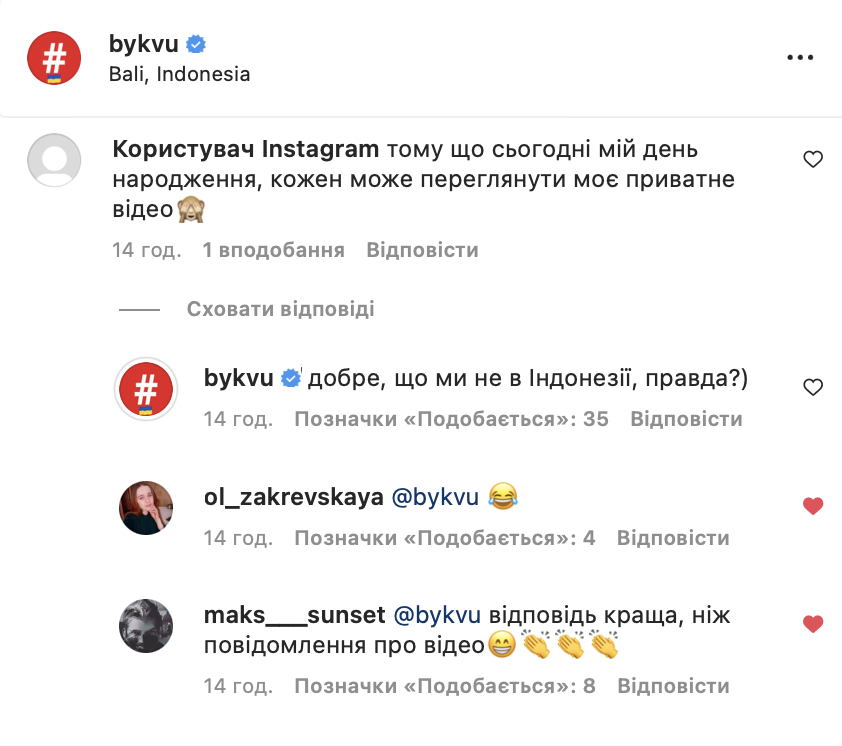
Under the same post, we quite seriously explained how such a ban would work and what the risks of such decisions are.
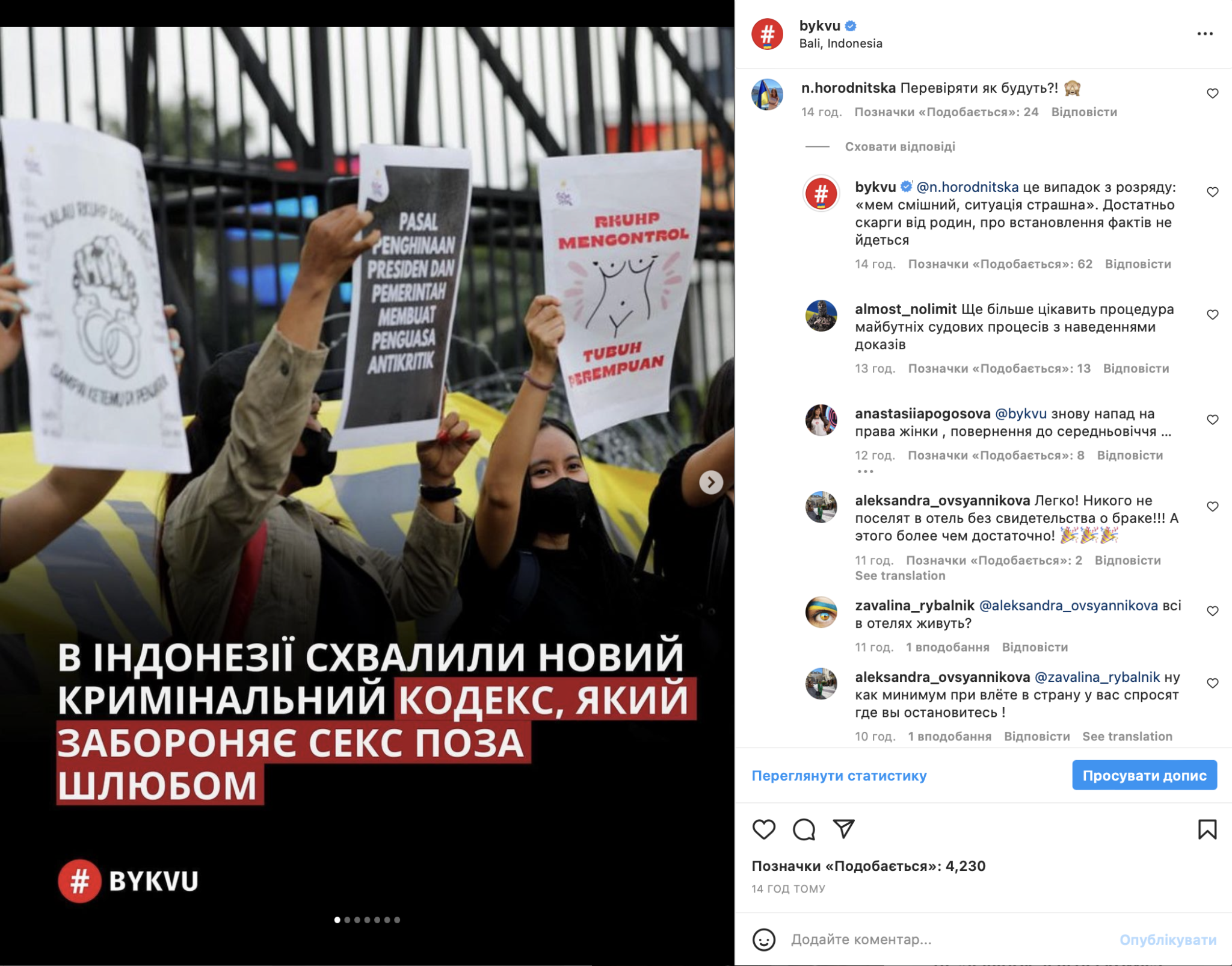
In today’s world, the mass media lost their monopoly on information a long time ago. It is impossible to have a correspondent in every part of the planet or even of one country. Instead, every person with a smartphone and access to social networks is a correspondent of their own and has own audience. The number of readers of global mass media is often smaller than the audience of even local bloggers, not to mention global stars. The times when the information in newspapers, radio or television was broadcast in one direction and was perceived as absolute truth had gone even earlier.
Being able to admit own mistakes and react to them is extremely important in this format. We also realize that our readers may have a higher level of competence in some areas and their comments should be taken into account. For example, a post about gold dentures found in a torture chamber, a lot of which were found after the liberation of the territories previously captured by the Russian army. The photo of this terrible find was first published by a local police official, and later by the official accounts of the Ministry of Defense of Ukraine in social networks, that is, in reliable sources.
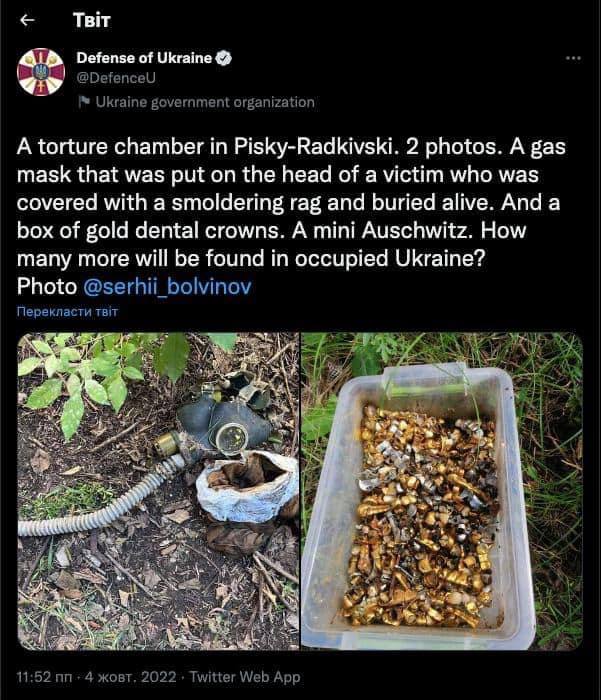
However, German journalists were later able to reach the site and found a local dentist who claimed that at least some of the found dentures had belonged to his own collection, and that the Russian military had probably robbed his house and taken the collection, believing that was pure gold. Our reader sent this information to us asking if we were going to publish it. In response, we provided her with a link to the report we quoted from the German journalists, noting that this was an extremely unfortunate case for any media, however, in this particular situation, we were glad that everyone was wrong and that the gruesome find came from the dentist’s collection and was not the result of torturing civilians during interrogations.
After that, the reader posted a story on her page praising the fact that we recognized the mistake, albeit unintentional, and published a rebuttal.
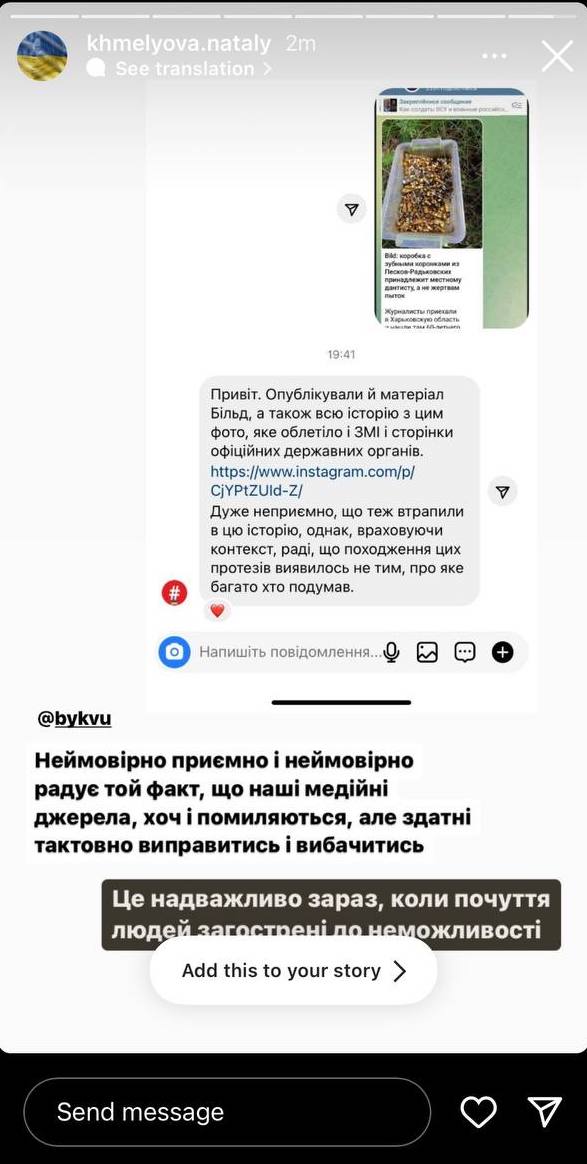
This is certainly not an excuse because it is our job to verify information even when it is not possible. We recognize that we are only humans, work in incredible conditions and always admit our mistakes.
After all the crimes of the Russian army, which have been documented by Ukrainian and foreign journalists and law enforcement officers, it seems that there are no longer any terrible atrocities that the occupying forces of the Russian Federation could not have commited.
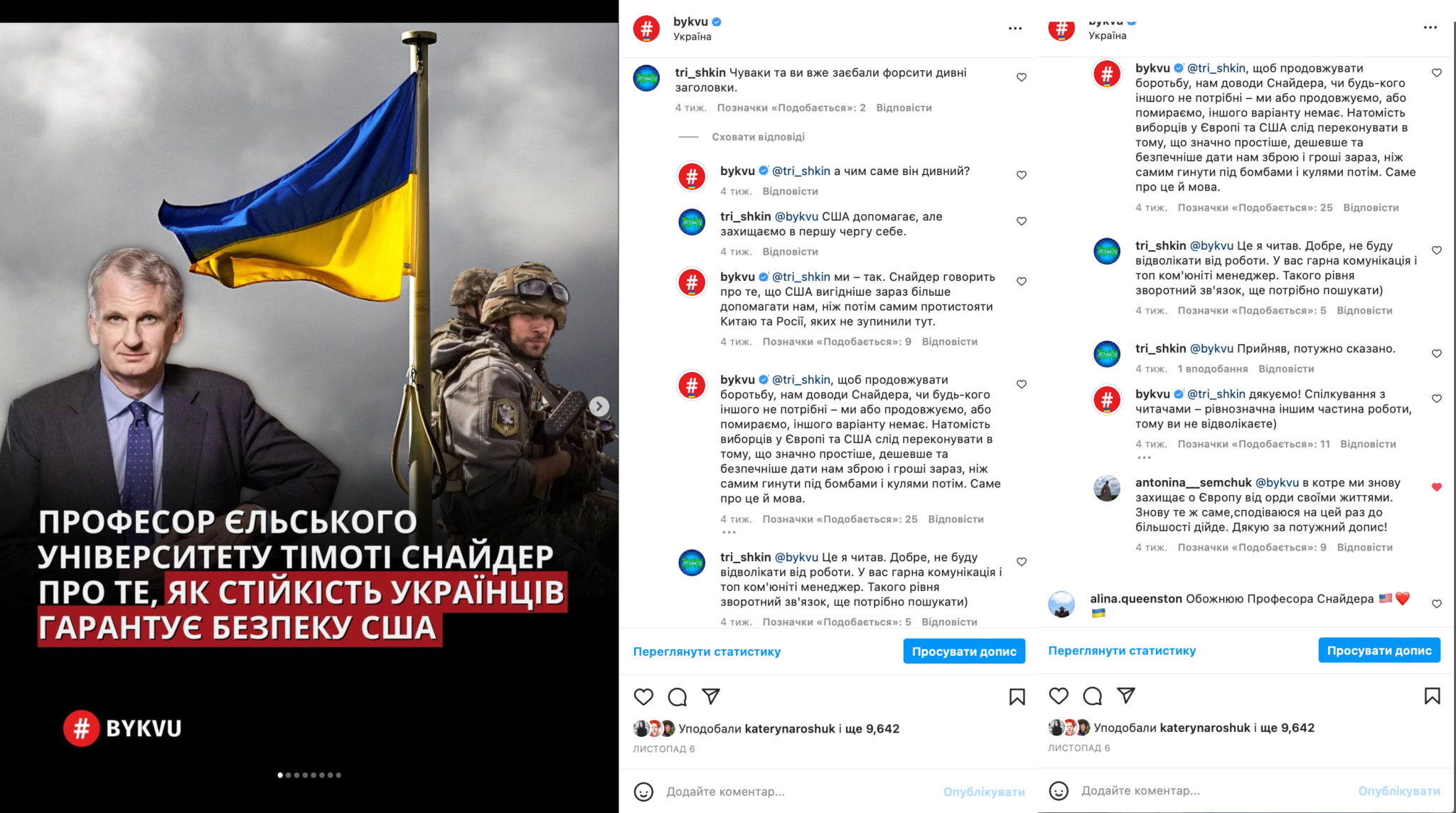
The screenshot of the post about Professor Timothy Snyder’s explanation of how helping Ukraine guarantees the security of the United States. In the comments, the reader expressed outrage at the loud headline, but we explained that these words of Professor Snyder are not intended to explain to Ukrainians that they are fighting for the security of the United States, but to explain to American politicians and taxpayers why providing aid to Ukraine now is more profitable for the United States , than a face-to-face fight with China afterwards. After the explanation, the reader withdrew his claims and praised our communication with the audience
Returning to the communication with critical readers, we note that it is important to understand the essence of criticism and the motives and emotions of the author. An example of such a case is the post in which we quoted Professor Timothy Snyder, who explained how the resilience of Ukrainians guarantees the security of the United States and is the best reason to continue helping Ukraine. It is obvious that Professor Snyder’s words were intended primarily for taxpayers and the US government, who do not face a threat to their very existence, unlike Ukrainians and Ukraine. Therefore, one of our readers was dissatisfied with the headline, which he considered too “loud”.
Instead of ignoring him or taking offense at unfair criticism, we decided to find out the reason for his dissatisfaction, and as a result, we were able to explain the meaning of Professor Snyder’s words and our post to Ukrainians and receive a favorable assessment of our work. The reader highly appreciated our communication and work with the audience.
We believe that today the media is primarily a platform for the exchange of ideas, where the audience and the media communicate with each other. In the endless flow of information generated by the Internet, the first place takes not the search for news as such, but the receipt of verified information, considering the context that preceded the event. The primary task of the media is to use their professional skills and knowledge so that the audience perceives the news not as a random set of events that are forgotten immediately after reading, but as a consistent chain of causes and effects and their impact on people and the world.
Without doubt, this is a much more difficult task, which requires constant attention. We cannot just publish a bunch of news during our working hours and forget about it until the next day, because our audience does not live according to our schedule. The conditions in which Ukrainian media are forced to operate today, and the challenges we face, both economic (unfortunately, we were forced to reduce our team) and social, make this task even more difficult, and the work of our editorial staff even more intense.
However, this is precisely how we see the role, mission and responsibility of the modern media. It is not just one-sided publication of news, but something more, which can be called an information mission. By establishing a constant dialogue to explain the context of events and different points of view, we help our readers to understand one other. The lives of many Ukrainians were destroyed 8 years ago, when the Russian Federation annexed Crimea and started the war in Donbas. This year, 9 months ago, the absolute evil came to the homes of all Ukrainians.
Sincerely, ‘Bukvy’ team
Vladislava Didenko, chief editor
Anna Lysa-Kuzmich, editor
Anastasiia Neseniuk, editor
Marharyta Yuziak, editor
Khrystyna Kachorovska, editor
Alina Honcharenko, editor
Yurii Nykorak, literary editor
Vitalii Skrynskyi, translator and editor
Danylo Antoniuk, photo reporter
Oleksii Chumachenko, photo reporter
Yaroslav Pechalnov, IT specialist
Sofiia Kalan, journalist
Viktoriia Maliuta, journalist
Polina Tymchenko, journalist and SMM
Maksym Holova, journalist and SMM
Myroslava Vorobei, journalist and SMM
Anastasiia Mosieieva, SMM
Nazar Chornyi, audience relations manager and head of the legal department

 Creative director of ROA Patrick Stengbye talking about the shoes he chooses for running, what the brand will surprise us with in 2024 and President Zelensky’s style
Creative director of ROA Patrick Stengbye talking about the shoes he chooses for running, what the brand will surprise us with in 2024 and President Zelensky’s style 




